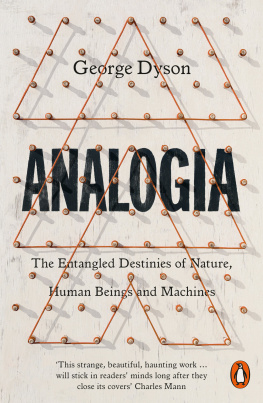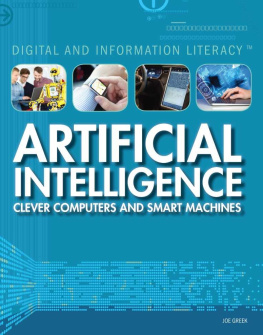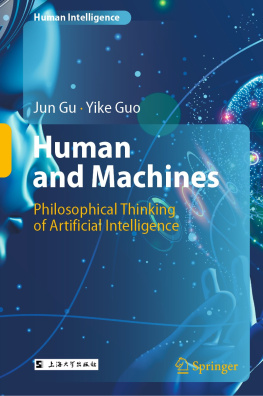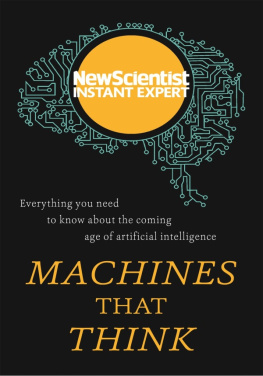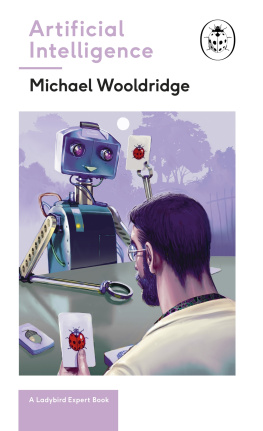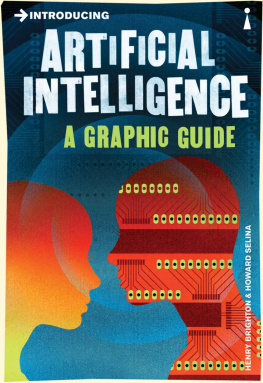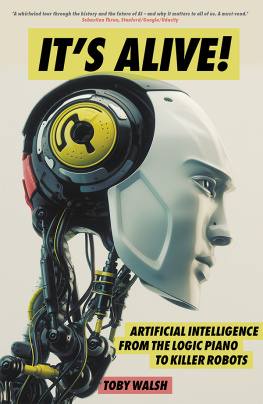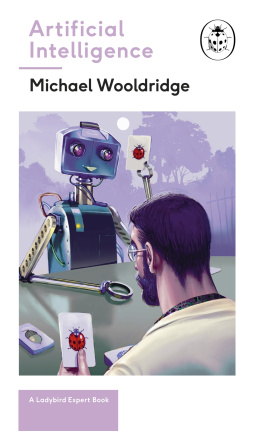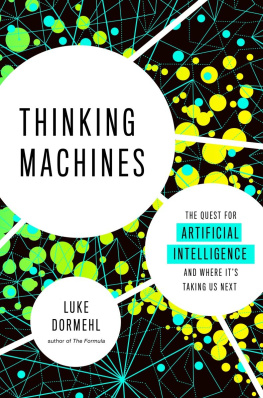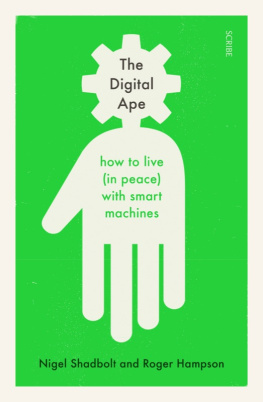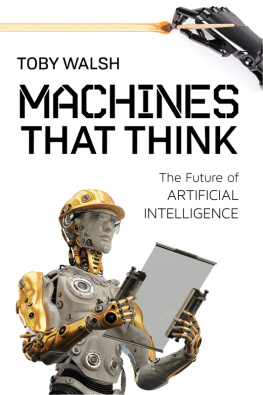DARWIN AMONG THE MACHINES
Brilliant... a wonderfully chewy, nuggety tour of the fields of ideas behind technological history; and its a felt piece of work too Francis Spufford, Literary Review
Presenting ideas from 20th-century scientists, as well as from professional thinkers like Hobbes, Babbage and Leibniz, George Dyson has come up with a nicely condensed history of the people and processes that have led to todays technology J. D. Biersdorfer, The New York Times Book Review
A cogent, succinct history of thinkers and thinking that paved the way... to todays technology Katie Hafner, Newsweek
George Dysons clever, eccentric Darwin among the Machines brings evolutionary thinking to bear on 21st-century subjects such as machine intelligence... His arguments are subtle and careful Maggie Gee, Daily Telegraph
Lucid and thoughtful Sadie Plant, The Times
ABOUT THE AUTHOR
George Dyson was born in 1953. Through his father, a mathematical physicist, his mother, a logician, and his sister, a computer industry analyst, he indirectly witnessed the conjunction of theory, technology and high finance which precipitated the information age. A kayak builder and ethnohistorian, his experience in the Canadian and Alaskan wilderness has sharpened his skills as an observer of the convergence between technology and living things.
DARWIN
AMONG THE
MACHINES
The Evolution of Global Intelligence
George Dyson
BASIC BOOKS
A Member of the Perseus Books Group
New York
Copyright 1997 by George Dyson
Published by Basic Books,
A Member of the Perseus Books Group
All rights reserved. Printed in the United States of America. No part of this book may be reproduced in any manner whatsoever without written permission except in the case of brief quotations embodied in critical articles and reviews. For information, address Basic Books, 250 West 57th Street, 15th Floor, New York, NY 10107.
Books published by Basic Books are available at special discounts for bulk purchases in the United States by corporations, institutions, and other organizations. For more information, please contact the Special Markets Department at the Perseus Books Group, 2300 Chestnut Street, Suite 200, Philadelphia, PA 19103, or call (800) 810-4145, ext. 5000, or e-mail .
First published by Addison-Wesley Publishing Company in 1997.
The woodcut on page 228, from The Famous History of Frier Bacon, 1679, appears by permission of the Huntington Library, San Marino, California.
Library of Congress Control Number: 2012943208
ISBN 978-0-465-04697-3 (e-book)
10 9 8 7 6 5 4 3 2 1
Anything can happen once.
PHILIP MORRISON
CONTENTS
T his is a book about the nature of machines. It is framed as history but makes no claim to have separated the fables from the facts. Both mythology and science have a voice in explaining how human beings and technology arrived at the juncture that governs our lives today.
I have attempted, in my own life and in this book, to reconcile a love of nature with an affection for machines. In the game of life and evolution there are three players at the table: human beings, nature, and machines. I am firmly on the side of nature. But nature, I suspect, is on the side of the machines.
In November of 1972, at the age of nineteen, I built a small tree house on the shore of Burrard Inlet in British Columbia, and settled in. In winter I consumed books and firewood; in summer I explored the British Columbian and Alaskan coasts. The tree house, ninety-five feet up in a Douglas fir, was paneled with cedar I found drifting in Georgia Strait, split into boards whose grain spanned as many as seven hundred years.
During those tree house winters I had lots of time to think. It got dark at four in the afternoon, rained for days on end, and, when the ocean fog rolled in, the earth, but not the sky, was obscured. At odd, unpredictable moments I found myself wondering whether trees could think. Not thinking the way we think, but thinking the way trees think; say, two or three hundred years to form the slow trace of an idea.
I spent the summers working on a variety of boats. When running at night I preferred to take the midnight-to-daybreak watch. By three or four in the morning, I was alone with the trace of unseen landforms on the radar screen and the last hour or two of night. I sometimes left the helm and paced the decks. The world receded in a phosphorescent wake, while birds appeared as red or green phantoms in the glow of the running lights, depending on whether they took wing on the port or starboard side. I also found myself slipping down into the engine room for more than the obligatory check.
When you live within a boat its engine leaves an imprint, deeper than mind, on neural circuits first trained to identify the acoustic signature of a human heart. As I had sometimes drifted off to sleep in the forest canopy, boats passing in the distance, and wondered whether trees might think, so I sat in the engine-room companionway in the small hours of the morning, with the dark, forested islands passing by, and wondered whether engines might have souls. This question threads its way through the chapters of this book.
We are brothers and sisters of our machines. Minds and tools have been sharpened against each other ever since a scavengers stone fractured cleanly and the first cutting edge was held in a hunters hand. The obsidian flake and the silicon chip are struck by the light of the same campfire that has passed from hand to hand since the human mind began.
This book is not about the future. Where we are at present is puzzling enough. I prefer to look into the past, exercising the historians privilege of selecting predictions that turned out to be right. The past is where we find answers to our questions: Who are we, and why? The future is where we see questions to which the answers are up to us.
Do we remain one species, or diverge into many?
Do we remain of many minds, or merge into one?
P rinceton Universitys Firestone Library, the largest open-stack collection in the world, is one of the few libraries that require a university identification card to get in. The job of guarding the turnstile at the entrance to the library must dull ones attention over the years, and I discovered in 1967 that by melting into the crowd of students flooding into the library at 8:30 in the morning, it was usually possible to sneak in. Firestones fifty-five miles of books, most of them shelved underground, offered a warm, anonymous refuge until it was safe to reappear out on the street and meet up with friends who had suffered through a day at school. I was left with a love of libraries, and a fear of librarians, that has lasted ever since.
Western Washington Universitys Fairhaven College granted me research associate status, with library privileges, to write this book. The Mabel Zoe Wilson Library is a small, comfortable facility, and to its resources I owe most of the citations appearing here. Special thanks go to Frank Haulgren and colleagues at interlibrary loan, who successfully pursued obscure requests. Bob Christensen, who enjoys confronting librarians as avidly as I shy away from them, helped excavate many things. Robert Keller, Marie Eaton, and others at Fairhaven College managed to bend the universitys rules around my absence of credentials. Without such support this book would not exist.
Next page

